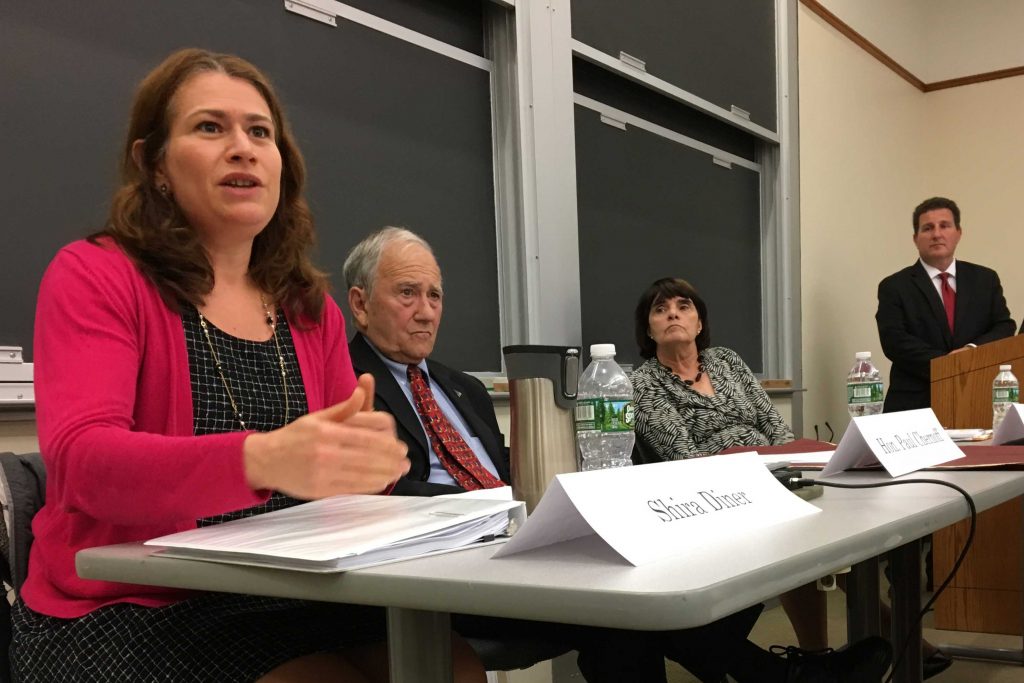The Massachusetts Supreme Judicial Court’s August decision in Brangan v. Commonwealth, and the State Senate’s recent passage of a criminal justice reform bill, have brought a renewed focus to bail reform among the Commonwealth’s judges, lawyers, and advocates. Against this backdrop, the BC Law Criminal Law Society hosted a panel discussion with experts from the bench and the bar on November 6.
“There’s always a risk when we do something different, but we all agree that if there’s a way to do it better, we should be doing it,” said panelist Marian Ryan ’79, Middlesex County district attorney (above, third from left).
The panel was moderated by Stuart Hurowitz, BC Law adjunct professor and supervising attorney in the Worcester District Court Office of the Committee for Public Counsel Services (CPCS). The Hon. Paul Chernoff, BC Law adjunct professor and retired associate justice of the Massachusetts Superior Court, and Shira Diner, supervising attorney in the Criminal Defense Training Unit of CPCS, rounded out the participating experts.
Hurowitz posed questions about changes to the Massachusetts bail system, disparate impacts of the current system in communities of color, the immediate effects of the Brangan decision, and the future of criminal justice reform in the state legislature, which Chernoff, Diner, and Ryan also addressed from their own perspectives.
Chernoff highlighted the inherent difficulty judges face when imposing bail. “It’s much harder than sentencing,” he said. “You know much less about the person, you’re often in an emotionally loaded District Court because the crime just happened, and it’s a negative-reinforcement business because the judge gets blamed as much as the individual if someone on bail doesn’t show up and gets into visible trouble.”
Chernoff also noted that it’s often more difficult for judges to set bail in poor communities where it’s “harder to determine what resources a person has.” He added that “Brangan is not a cure-all, but it’s helpful, and bail reform in general is helpful.”
Diner, who wrote CPCS’ brief in the Brangan case, has spent more than two years studying and litigating the issue. Although she granted that “Massachusetts has a good bail statute because it requires an individualized determination,” she still focused her remarks on the equal protection and due process issues with the system.
“It’s unfair to poor people who can’t afford bail, which makes them more likely to plead guilty and lose their jobs, homes, or freedom,” she said. “Setting bail in an amount you can’t pay is a de facto detention order.” Diner was hopeful that Brangan is a move in the right direction, but cautioned against using risk assessment tools and matrixes, or focusing too much on reform programs in other states with very different systems.
Ryan was encouraged by the post-Brangan results in Middlesex County, saying, “I think it’s all been good. Judges are getting as much good information as possible in the time parameters and being thoughtful.”
She also stressed the need for data-driven reorganization and reform. “I’m encouraged by the results since Brangan,” she said. People are adjusting and people want to do the right thing. It’s a question of empowering them and giving them the information to do that.”
Photo, left to right: Shira Diner, Hon. Paul Chernoff, Marian Ryan, and Stuart Hurowitz.


